|
 Secure Site
Secure Site
|
 |
Archive for April, 2012
 Our Zen Timepiece's acoustic 6-inch brass bowl-gong clock is the world's ultimate alarm clock, practice timer, and "mindfulness bell." If you’re trying to reduce your sensitivity to pain, Zen meditation may help by actually thickening your brain, new research suggests.
The authors of a new study, published in a special issue of the journal Emotion, reached their conclusions after comparing brain thickness in 17 Zen meditators and a control group of 18 people who didn’t meditate and hadn’t practiced yoga or suffered from chronic pain, brain disease or mental illness.
The researchers applied heat to the participants’ calves and used MRI scans to study how their brains reacted to the pain.
“Through training, Zen meditators appear to thicken certain areas of their cortex, and this appears to underlie their lower sensitivity to pain,” study author Joshua A. Grant, a doctoral student in the University of Montreal’s department of physiology, said in a news release from the school. “We found a relationship between cortical thickness and pain sensitivity, which supports our previous study on how Zen meditation regulates pain.”
“The often painful posture associated with Zen meditation may lead to thicker cortex and lower pain sensitivity,” Grant said. He added that meditation could be a way for people to manage pain, reduce age-related brain shrinkage and deal with the effects of stroke.
Need a meditation timer? Get the natural one: A Bowl-Gong Bamboo Zen Timepiece from Now & Zen
Spiritual practices such as meditation or yoga are best done in an environment of beauty and tranquility. And the clock/timer you use for your practice can make a real difference in creating such an environment. But using a timer with artificial “beeps,” or even “recorded gongs,” coming out of a plastic box can be less than ideal. The Bamboo Zen Timepiece is unlike any other meditation timer on the market because it features a real, natural, acoustic, long-resonating gong, produced by its traditional Japanese style bowl-gong, or “rin-gong”. Moreover, The Zen Timepiece is made with sustainable natural bamboo, so it is as beautiful to see as it is to hear. Once you use a Zen Timepiece, nothing else will do.
More information
Learn more about the workings of the brain at Harvard University’s Whole Brain Atlas.— Randy Dotinga
SOURCE: University of Montreal, news release, Feb. 24, 2010
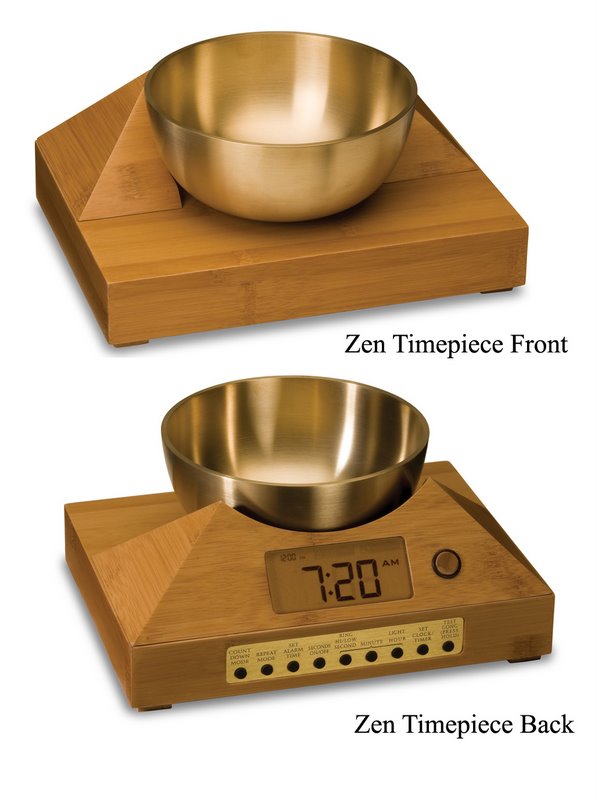 “Mindfulness” is the spiritual practice of being aware of your present moment. Now & Zen – The Gong Meditation Timer & Clock Shop
1638 Pear Street
Boulder, CO 80302
(800) 779-6383
orders@now-zen.com
Posted in Bamboo Chime Clocks
 It's okay to nap during the day - Choose a gentle wake up - a Chime Zen Alarm Clock Have you ever felt an overpowering urge to find privacy and a bed for a midday “quickie?” Don’t feel guilty about that. It’s just your body telling you what it needs — sleep!
It’s unfortunate that most daily schedules can’t accommodate that need. Quickie naps are good for you. During the nap period of seeming inactivity, you do not simply “turn off;” complex reparative processes occur in your body. While the exact physiologic mechanisms responsible for the benefits of napping are not yet well understood, its positive outcomes have been confirmed in studies: they include improvements in mood, alertness, memory, performance and decision-making ability.
Let’s start with the best time for a nap: afternoon. An afternoon nap does not disrupt normal circadian (meaning: about a day) rhythms, whereas a morning or evening nap can — making it harder for you to return to your usual sleep routine that night. Your body probably already tells you this: circadian changes in your hormones and temperature are likely to make afternoon a naturally sleepy time for you. These cyclical patterns help explain why simply tacking more minutes or hours of sleep onto your nocturnal sleep time won’t necessarily prevent afternoon sleepiness. No matter how much you sleep at night, the afternoon urge will probably hit you.
How long should you nap? About 20 minutes. Anything much longer can backfire. You know that prolonged groggy feeling you sometimes feel after a nap? It’s called sleep inertia; you may have experienced it if you napped too long. Sleep inertia can take anywhere from 15 minutes to 4 hours to wear off. During this period, studies have shown impairments in mood, alertness, memory, performance and decision-making abilities. The likelihood of developing sleep inertia depends on several factors, one of which is the sleep stage from which you awaken. In a June, 2006 study in Sleep (the peer-reviewed publication of the Associated Professional Sleep Societies), investigators demonstrated the positive cognitive effects following 10- and 20-minute naps, but also the negative effects of sleep inertia following a 30-minute nap. The 30-minute timing coincides with the normal onset of deep sleep (also called slow-wave sleep). Limiting your nap time will help prevent entry into deep-sleep stages — avoiding sleep inertia while minimizing disruptions to your normal nocturnal sleep.
 Choose the most natural wake up -- a gentle Zen Alarm Clock with Soothing Chimes Keep in mind quickie-napping can’t compensate for significant sleep debt. While the increasing demands of our lifestyles may not reflect it, a wealth of research has verified that most adults require an average of 7 to 9 hours of sleep each night. Be mindful of persistent sleepiness throughout the day, despite adequate nocturnal sleep: it may be a symptom of a sleep disorder (such as narcolepsy, periodic limb movements, or obstructive sleep apnea) or an underlying medical problem (such as thyroid disease, serious infection or illness, anxiety or depression). Always listen to your body and speak with your doctor about your concerns.
And … try to sneak in a midday nap. But, remember, keep it quick!
Dr. Nayer Khazeni specializes in internal medicine and pulmonary/critical care, teaches, and conducts research at Stanford University Medical Center.
Waking up in the morning should be as pleasant as falling asleep at night. The Zen Alarm Clock’s gradual, gentle awakening is transformative.
Our Zen Timepiece’s acoustic 6-inch brass bowl-gong clock is the world’s ultimate alarm clock, practice timer, and “mindfulness bell.”
It fills your environment with beautifully complex tones whenever it strikes. In the morning, its exquisite sounds summon your consciousness into awakening with a series of subtle gongs that provide an elegant beginning to your day. Once you experience the Zen Timepiece’s progressive awakening, you’ll never want to wake up any other way. It also serves as the perfect meditation timer. Available in 5 wood styles, including bamboo.
adapted from sfgate.com by Nayer Khazeni, M.D.
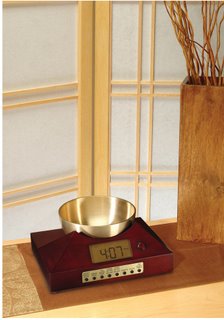 The Zen Timepiece - An acoustic 6-inch brass bowl-gong clock Now & Zen – The Bowl Gong Clock Store
1638 Pearl Street
Boulder, CO 80302
(800) 779-6383
orders@now-zen.com
Posted in sleep, Sleep Habits, wake up alarm clock, Zen Alarm Clock, Zen Timepiece by Now & Zen, Zen Timers
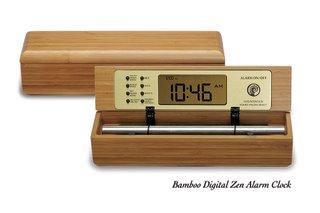 gentle, chime alarm clocks Fundamentally, dreams — like effective cognitive psychotherapy — “are about abstraction, the ability to pan back, get bigger than, stretch into the remembrance of a larger sense of self,” Naiman says.
And in this hard-charging, info-slurping, sleep-deprived era, in which about 70 million Americans suffer from chronic sleep disorders (and depression is also suspiciously widespread, affecting one in eight women), he and many other sleep experts are more convinced than ever of the link between mental health and a full nightly menu of sleep.
We asked the experts for their best tips to help you get restful sleep — ideally, seven to eight hours of it — that will yield all the dreams you’ve got coming to you.
Drink Moderately, And Mind Your Meds
“A glass of wine with dinner is fine,” Naiman says, but excessive alcohol will cause you to wake up after two or three hours when the sedative effects wear off; this interacts with the first significant REM cycle and disrupts sleep further from there.
Also, many medications — including a number of antidepressants, over-the-counter painkillers, and even, ironically enough, sleeping pills — suppress the hormone melatonin and/or the nutrient choline, both of which mediate REM. It’s always wise, Naiman says, to ask your pharmacist before taking any medicine if it has a REM suppressant and, if it does, whether there’s an alternative.
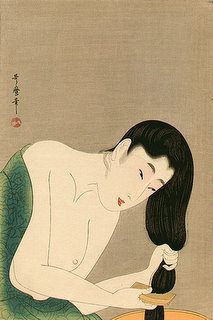 Utamaro Kitagawa, Bijin Combing Her Hair, 1750-1806 Establish A Presleep Routine
Take a 20-minute soak in a hot bath two hours before bedtime, Cartwright says. The body’s effort to cool itself after the bath mimics the cooling that occurs naturally as our bodies prepare for sleep.
If your logical waking brain is reluctant to let go of the same old anxieties, Cartwright suggests writing down the day’s cares (well before bedtime) in a worry diary, then literally closing the book, telling yourself, I’ve done my worrying for the day.
Create A Restful Environment
Use blackout shades or a sleeping mask to make the room as dark as possible; darkness prompts your brain’s pineal gland to make melatonin. Also, keep your bedroom at a comfortable 60 to 65 degrees; even subtle shifts in body temperature can disrupt sleep cycles.
 create a calm environment Put Technology To Work
Relaxation CDs have moved beyond ocean waves; new versions actually have frequencies embedded in the sound tracks to encourage slow-wave sleep. (Check out sound therapist Jeffrey Thompson’s sleep-enhancement collection atneuroacoustic.com.)
Soothe Yourself If You Wake Up
If you have trouble falling back to sleep, Cartwright advises adjusting your strategy depending on the time of night. If you’re waking up after only an hour or so, try some boring mental exercise: See if you can name all 50 states alphabetically, or count backward from 100, inhaling deeply and slowly, then exhaling with each number.
Use a Gentle, Chiming Alarm Clock to wake-up so that you will be calm in the morning.
Woodson Merrell, M.D., chairman of the Department of Integrative Medicine at Beth Israel Medical Center in New York City, advises trying to remember the dream you were having when you woke up — even if you can recall only a detail or two — and focusing on it to see if you can drift off again.
If it’s close to your usual wake-up time — say it’s 5 a.m. and you usually wake at 7 — your core body temperature will just be starting to rise to get you active for tomorrow, which may make it hard to go back to sleep, Cartwright says. “The best thing is to take a positive attitude and don’t say to yourself, I’m going to be draggy all day,” she advises. “Instead say, Great, I have two more hours to rest!”
Let Go
“People with insomnia are hyperaroused — pushing, pushing,” Naiman says. “We’re all working so frantically to get a chance to rest. But the paradox is that rest is free.” And, he adds, the great beauty of dreaming — in which “parts of ourselves that recede during waking life” roam freely and creatively — is that “you don’t have to force it to happen. It’s just there for you when you stop.”
Whole Living, November 2010
Text by Louisa Kamps
Now & Zen’s Chime Alarm Clock Store
1638 Pearl Street
Boulder, CO 80302
800) 779-6383
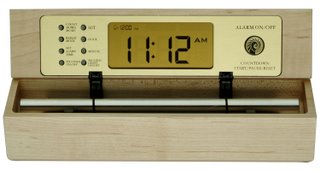 choose a chime alarm clock with soothing tones
Posted in Chime Alarm Clocks, Dreams
 How to Zazen - Stillness of Being As the name Zen implies, Zen sitting meditation is the core of Zen practice and is called zazen in Japanese. The posture of zazen is seated, with folded legs and hands, and an erect but settled spine.
The legs are folded in one of the standard sitting styles. In many practices, one breathes from the hara (the center of gravity in the belly) and the eyelids are half-lowered, the eyes being neither fully open nor shut so that the practitioner is not distracted by outside objects but at the same time is kept awake.
How to Zazen, a Sitting Mindfulness Practice adapted from wikipedia.org
 Meditation Clock Timer- Zen Timers and Alarm Clocks by Now & Zen Use our unique “Zen Clock” which functions as a Yoga & Meditation Timer. It features a long-resonating acoustic chime that brings your meditation or yoga session to a gradual close, preserving the environment of stillness while also acting as an effective time signal. Our Yoga Timer & Clock can be programmed to chime at the end of the meditation or yoga session or periodically throughout the session as a kind of sonic yantra. The beauty and functionality of the Zen Clock/Timer makes it a meditation tool that can actually help you “make time” for meditation in your life. Bring yourself back to balance.
Now & Zen – The Yoga & Meditation Timer Store
1638 Pearl Street
Boulder, CO 80302
(800) 779-6383
Posted in Chime Alarm Clocks, Japanese Inspired Zen Clocks, Meditation Timers, Meditation Tools, mindfulness practice, Now & Zen Alarm Clocks, Zen Timers
 Wake Up Refreshed - Choose a Z E N Alarm Clock - Utamaro Ukiyoe Wood Pipe by Yukisakuma “Waste not life,” wrote Benjamin Franklin, patron saint of American entrepreneurs. “In the grave will be sleeping enough.”
Centuries later, the attitude toward sleep in America – and in American business, in particular – has scarcely changed. Corporate culture reveres the e-mail sent at 3 a.m., the executive who rushes directly into a meeting from a red-eye flight. Bumper stickers offer an updated version of Franklin’s dictum: “I’ll sleep when I’m dead.”
“There is a cultural bias against sleep that sees it as akin to shutting down, or even to death,” explains Dr. Jeffrey Ellenbogen, a neurologist at Harvard Medical School and director of the Sleep Laboratory at Massachusetts General Hospital.
Most people, Ellenbogen says, think of the sleeping brain as similar to a computer that has “gone to sleep” – it does nothing productive. Wrong. Sleep enhances performance, learning and memory. Most unappreciated of all, sleep improves creative ability to generate “aha” moments and to uncover novel connections among seemingly unrelated ideas.
Steve Jobs, the chief executive of Apple, once defined creativity as “just connecting things.” Sleep assists the brain in flagging unrelated ideas and memories, forging connections among them that increase the odds that a creative idea or insight will surface.
While traditional stories about sleep and creativity emphasize vivid dreams hastily transcribed upon waking, recent research highlights the importance of letting ideas marinate and percolate.
“Sleep makes a unique contribution,” explains Mark Jung-Beeman, a psychologist at Northwestern University who studies the neural bases of insight and creative cognition.
Some sort of incubation period, in which a person leaves an idea for a while, is crucial to creativity. During the incubation period, sleep may help the brain process a problem.
“When you think you’re not thinking about something, you probably are,” says Jung-Beeman, who has a doctorate in experimental psychology.
 Wake up refreshed, love your alarm clock, transform your mornings with The Zen Alarm Clock's progressive awakening with gentle chimes. Another theory is that typical approaches to problem-solving may decay or weaken during sleep, enabling the brain to switch to more innovative alternatives. A classic switching story, recounted in “A Popular History of American Invention” in 1924, involves Elias Howe’s invention of the automated sewing machine: After much frustration with his original model, which used a needle with an eye in the middle, Howe dreamed that he was being attacked by painted warriors brandishing spears with holes in the sharp end. He patented a new design based on the dream spears; by the time the patent expired in 1867, he had earned more than $2 million in royalties.
Spear-wielding savages make for compelling stories, but creative insights directly induced by dreams are rare. In general, people are unaware of sleep’s effects on their performance.
Ellenbogen’s research at Harvard indicates that if an incubation period includes sleep, people are 33 percent more likely to infer connections among distantly related ideas, and yet, as he puts it, these performance enhancements exist “completely beneath the radar screen.”
 Sleep sounder - wake up refreshed - choose a natural chime alarm clock In other words, people are more creative after sleep, but they don’t know it.
This lack of awareness makes it hard to identify specific “aha” insights that have been prompted by sleep.
“It’s more that sleep brings a change of approach,” explains Mark Holmes, an art director at Pixar Animation Studios who worked on the film “WallE.” “You can get tunnel vision when you’re hammering away at a problem. You keep going down this same path, again and again, just tweaking, making incremental changes at best. ” He continues: “Sleep erases that. It resets you. You wake up and realize – wait a minute! – there is another way to do this.”
Business attitudes toward sleep may be starting to shift. Claire Stapleton, a spokeswoman for Google, says grassroots interest in sleep led to an on-campus talk by Sara Mednick, a napping expert. Google also installed EnergyPods, leather recliners with egglike hoods that block noise and light, for employees to take naps at work.
Other companies that have installed EnergyPods include Cisco Systems and Procter & Gamble.
Vinayak Sudame, an engineer at the Research Triangle Park campus of Cisco, says he uses an EnergyPod to “shut my eyes and shut myself off for 10 or 15 minutes” when he is working on a problem or needs some quiet time. More than a walk or a coffee break, he says, this type of “total mental rest” helps him return to work with a reorganized perspective.
Alertness Solutions, a sleep consulting company in Cupertino, provided consultations and recommendations to several U.S. Olympic teams before the Beijing Games and also works with corporate clients. Bob Agostino, vice president of operations at L.J. Aviation, in Latrobe, Pa., worked with Alertness Solutions at a previous employer and says that employees learned specific strategies to improve performance. These included when and how long to nap, how to determine the amount of sleep one needs, and how to recognize signs of fatigue and symptoms of sleep disorders.
Acting on this knowledge, Agostino says, “gives you an edge.”
In general, West Coast companies are more concerned about sleep issues than their East Coast counterparts, says Arshad Chowdhury, co-founder and chief executive of MetroNaps, which developed the EnergyPods.
“Particularly in New York, where financial services play such a big role, people are consistently sleep-deprived and consistently in denial,” he says.
Chowdhury – who says the idea for EnergyPods came to him in a nap – recalls a seminar in which one banker responded to a survey question with a note saying she knew she had no fatigue-related problems at work because the only time she fell asleep was when she sat still. Chowdhury laughs a bit ruefully: “Maybe we could have avoided the crisis we are in now if these people had just gotten proper sleep.”
Wake up with gradual, beautiful acoustic chimes. The Zen Alarm Clock transforms your mornings and gets you started right, with a progressive awakening.
Our Bamboo Digital Zen Clock’s long-resonating Tibetan bell-like chime makes waking up a beautiful experience – its progressive chimes begin your day with grace. When the clock’s alarm is triggered, the acoustic chime bar is struck just once … 3-1/2 minutes later it strikes again … chime strikes become more frequent over 10 minutes … eventually striking every 5 seconds until shut off. As they become more frequent, the gentle chimes will always wake you up – your body really doesn’t need to be awakened harshly, with a Zen Clock you’re awakened more gradually and thus more naturally. Unlike artificial recorded sounds coming out of a tiny speaker in a plastic box, natural acoustic sounds transform your bedroom or office environment.
adapted from sfgate.com by Leslie Berlin
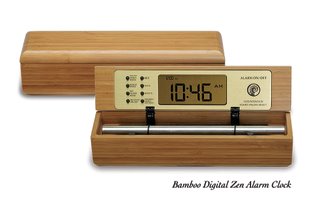 Wake Up The Most Natural Way -- Choose a Gentle Chime Alarm Clock Now & Zen – The Chime Alarm Clock Shop
1638 Pearl Street
Boulder, CO 80302
(800) 779-6383
orders@now-zen.com
Posted in Bamboo Chime Clocks, Chime Alarm Clocks, Now & Zen Alarm Clocks, sleep, Sleep Habits
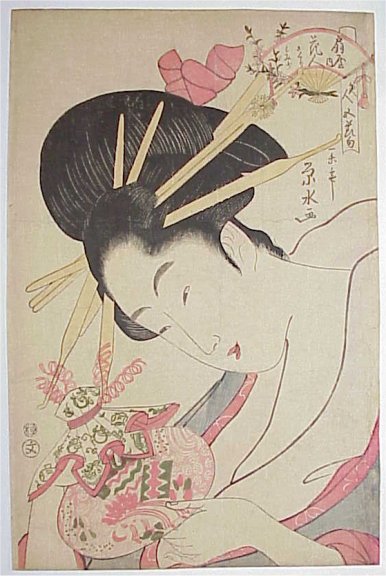 What is keeping you awake? Eliminate clutter...Eisui If you are having trouble sleeping, your bedroom could be to blame.
Too many people clutter their sleep environment with reminders of daytime responsibilities: a desk piled with bills, a computer with e-mail, a fax machine, a telephone . . .
Combine that with an increase in street noise and outside light filtering in from streetlights and outdoor security systems. It’s no wonder insomnia caused by environmental factors is on the rise.
The good news is the sleep environment is controllable and, with some attention to details, you can design a good night’s sleep.
As many as 43 percent of American adults suffer from insomnia, according to this year’s National Sleep Foundation Gallup poll. If you cannot identify a cause for your sleeplessness, specialists advise taking inventory of your sleep environment. Identify what may be sabotaging your sleep in the bedroom and redesign that space.
SLEEP, NOT WORK
In today’s houses where space is at a premium, many rooms must do double duty. Often, the bedroom also functions as a home office or a private area for parents with a TV set. All this equipment, experts say, is not conducive to sleep.
“People are clueless when it comes to designing their bedrooms for their fundamental purposes — sleep and sex — yet wonder why they have insomnia when their rooms are filled with so many distractions,” explains Al Reichert, technical supervisor of the Sequoia Sleep Disorders Center in Redwood City.
“Some people have virtual offices in their bedrooms — computers, e- mail, faxes, telephone — and then can’t figure out why they can’t sleep,” remarks Reichert.
 Choose a peaceful wake up - The Z E N Alarm Clock - the only clock with natural sounds The body actually has a physiological response to its environment, experts say. But since people aren’t usually aware of this response, linking work space in the bedroom with sleeping problems may be difficult.
“Any activity that is associated with being awake in the bedroom, like work, can be a problem,” explains Dr. Jerrold Kram of the California Center for Sleep Disorders in Oakland.
“It is an even more extreme problem for people who work in bed — answering the phone, reading important papers, studying and taking notes,” says Kram. “Their body becomes ingrained with being awake in bed, and any awake activity — defined as an activity that requires alertness — is not what you want to perpetuate in an environment intended for sleep.”
If space constraints preclude emptying the bedroom of work-related paraphernalia, consider separating work and sleep spaces in the room. A freestanding partition or decorative screen can enclose the bed for a cozy sleep environment. Adding a sleeping loft above the work space for the bed can also distinguish working and sleeping spaces.
QUIET, PLEASE
Environmental noise is a huge issue, especially for people who must sleep during the day because of work schedules. But noise can even affect the quality of sleep for those who sleep at night — especially if they live on a busy street, near an airport or train station, or with a snoring bedmate.
“When I started in this business of sleep disorders, it didn’t dawn on me that people can get accustomed to noise, and not recognize that it can still be disruptive or problematic,” says Kram. “Someone will come in and say, ‘I sleep badly; I wake up a lot,’ but have no idea what woke them.”
Kram relates studies in which a bell was rung every two or three minutes near sleeping patients.
“When the patient was asked in the morning if they remembered the bell ringing, they responded, `What? Are you out of your mind? There was no bell!’
“But when we examined their brain waves, they had had an awakening or arousal for a few seconds every three minutes. These arousals cause fragmented sleep and result in sleep deprivation.”
Fragmented sleep can result in an achy feeling, lack of concentration and mental fatigue the next day.
White noise neutralizes jarring, intermittent sounds. Installing a fan or air conditioner in the room not only provides white noise but also controls the temperature for comfortable sleep.
Another option is to purchase a white noise generator that emits a broad spectrum of sound at a constant volume. Some generators replicate the pleasing sounds of an ocean or steady rain and mask unwanted noise.
“Eventually, you will habituate to this white noise, and disruptive environmental noise will become less of a factor,” Reichert explains.
Sleep specialists also recommend aids such as “industrial strength” earplugs fitted by a doctor, or earphones attached to white noise generators, especially if a snoring bedmate is causing the noise pollution.
To clients who are remodeling their bedrooms, Kram often recommends adding extra insulation to rooms and changing to soundproof windows. And it may be necessary to cover hardwood floors and replace light and airy window shades with heavy, noise-absorbing draperies.
LIGHTS OUT
Light filtering through window shades may provide a warm glow to a room, but artificial or natural light exposure may also rob people of sleep. Blackout shades are a must for those who sleep during the day. But those bothered by errant light at night also should consider them.
“Light is a powerful cue that resets the body’s circadian rhythm and tells it to wake up,” explains Audrey Chang of the Better Sleep Council of Washington, D.C. The council reports findings from a recent study that show exposure to even moderate levels of light at night — such as artificial light — can throw off the body’s internal clock and cause a state similar to jet lag.
“For many people, you can’t even have a streetlight down your block filtering in,” says Darlene Sanders, former designer of sleep labs and now a representative for Roc-lon TLC, a manufacturer of blackout draperies based in Baltimore, Md.
Blackout draperies have come a long way from the vinyl-coated drapery liners of years past. All-in- one fabrics produced with a heat transfer process on polyester-and- cotton-base cloth feature patterns resembling fabrics from silk moire to denim. Hidden magnetic closures in the seams provide total light control.
COLOR CONSCIOUS
Bright reds, hot oranges and intense yellows are probably not the best colors for a sleep environment, says interior designer Paula McChesney of San Mateo. But the conventional bedroom colors of muted blues and soft greens will not work for everyone, either.
“There is a distinct part of our brain that relates to color memory, much like certain smells help us recall something from the past,” explains McChesney. The designer, who has had careers in both health care and interior design, has focused much of her work on exploring how color affects people.
“If Grandma’s home was in shades of blue and you were unhappy there, chances are blues won’t relax you now,” she says.
Hue and intensity are also important.
“Some people would find a midnight blue cozy and good to sleep in, but for me it would be claustrophobic. I would like a turquoise blue that reminds me of the Caribbean,” McChesney says.
For a relaxing environment, she says, avoid high contrast, such black and white, and patterns such as bold stripes or diagonals that excite the eye.
The best bedroom design for sleep ultimately comes down to what the National Sleep Foundation calls the three basics: cool, dark and quiet.
One of the ultimate Zen like experiences is waking-up from a great slumber refreshed and energized. Your mind and body are harmoniously one, both alert and focused. Having a refreshed mind and body are two keys to a natural and Zen lifestyle. Waking up in the morning should not be a loud and abrupt awakening, but rather it should be a peaceful positive experience. The right natural alarm clock can transition your deep and tranquil sleep into a serene start to consciousness. Imagine a long-resonating Tibetan bell-like chime waking you up to a beautiful morning experience.
The right alarm clock can be the most beneficial investment for you. With our Now & Zen natural alarm clock you are awakened more gradually and thus more naturally. Now & Zen is focused on creating a naturalistic lifestyle, and our clocks are an example of our philosophy.
adapted from sfgate.com by Gail Benchener
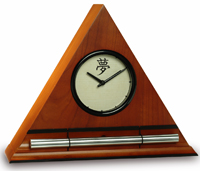 Natural Sounding Alarm Clocks -- Vibrating Chime Bar Wakes You Gently Now & Zen – The Most Natural Awakening – Slow & Gentle
The Z E N Alarm Clock Store
1638 Pearl Street
Boulder, CO 80302
(800) 779-6383
orders@now-zen.com
Posted in Bamboo Chime Clocks, Natural Awakening, sleep, Sleep Habits
 How to choose a great alarm clock with natural sounds - Visit Now & Zen, Inc. - Boulder, CO The next time you think about studying all night with your face in a book, think about this: Your brain will work better if you sleep on that book instead.
Shut-eye may be a good performance-boosting strategy, according to a new study presented at the Society for Neuroscience Conference in Atlanta.
Scientists from Harvard University studied nearly 100 college students to find out whether sleep can improve memory.
They divided the students into two groups and told each student to memorize several lists of related words — such as bed, sheet, and pillow or sill, glass, and pane — as they were read aloud.
The first group tried to memorize the lists at 9 a.m. while the second group tried to memorize the lists at 9 p.m.
The memory test came 12 hours after the students had first heard the words.
So, daytime learners were tested at 9 p.m. while night learners were tested at 9 a.m.
But the students who first learned the words during the evening got a good night’s rest before facing their memory test the next morning.
Each group was asked to write down all the words that they could remember. Researchers found that the students who studied the lists at 9 p.m. and got some sleep remembered more words than the students who were tested after staying awake throughout the day.
The Phenomenon of Remembering Incorrectly
However, the students who got some sleep also recalled some words that were not on the lists.
From a list of words including bed, sheet and pillow, a student may incorrectly remember the word “sleep” or form a false memory for the word “window” in a list including sill, glass and pane.
The students were remembering words that were associated with the ones that they had actually heard.
Scientists call this phenomenon of incorrectly remembering something that didn’t happen a “false memory.”
False memories are not all that unusual. It’s similar to a feeling you have when you think you’re sure that something happened — until someone proves you wrong.
Then you realize that your false memory was just an idea very closely related to something that happened in reality.
Sleep Plays a Role in False Memories
The students who snoozed before testing had more of these false memories than their friends who did not sleep.
This is the first time scientists have seen that sleep plays a role in false memories — and researchers are excited about the discovery.
The finding suggests that the brain is hardly asleep when the rest of the body is.
“Sleep is not a passive state where we lay around and lose productivity, but an active process during which the brain is integrating information,” said Dr. Christoph Nissen, sleep researcher and postdoctoral fellow at the Western Psychiatric Institute in Pittsburgh.
According to this study, the brain is engaged in a sort of wordplay while the body is asleep.
 sleep improve ones memory This finding suggests that a learning process occurs during sleep that has a lot to do with language and what words mean, says Dr. Lawrence Epstein, past president of the American Academy of Sleep Medicine, and medical director of Sleep Health Centers in Boston.
Our brain forms links between our memories for these words to help us store information in a way that is meaningful to us.
During sleep, “our brain is writing a summary,” said Dr. Robert Stickgold, study author and associate professor of psychiatry at Harvard Medical School and Beth Israel Deaconess Medical Center.
When the brain awakes, it may recall words from this summary even though those words weren’t part of the original exercise.
Forget the All-Nighters
Sleep may do interesting things to our memories, but not sleeping can wreak havoc on the brain and on the body.
Experts say that getting enough sleep is vital to our overall health.
It plays a role in immune function, emotional regulation, and other processes like the ability to concentrate.
There’s no substitute for serious studying, but a good night’s sleep may prove to be more helpful than scientists previously thought.
“People who study and then sleep recall things better than people who stay up all night studying,” Epstein said.
Boulder, Colorado—an innovative company has taken one of life’s most unpleasant experiences (being startled awake by your alarm clock early Monday morning), and transformed it into something to actually look forward to. “The Zen Alarm Clock,” uses soothing acoustic chimes that awaken users gently and gradually, making waking up a real pleasure.
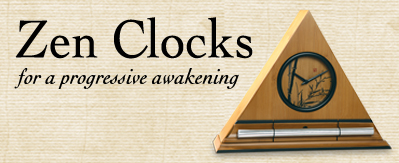 Get help choosing a different alarm clock -- Visit our store - Now & Zen, Inc. - Boulder, CO Rather than an artificial recorded sound played through a speaker, the Zen Clock features an alloy chime bar similar to a wind chime. When the clock’s alarm is triggered, its chime produces a long-resonating, beautiful acoustic tone reminiscent of a temple gong. Then, as the ring tone gradually fades away, the clock remains silent until it automatically strikes again three minutes later. The frequency of the chime strikes gradually increase over ten-minutes, eventually striking every five seconds, so they are guaranteed to wake up even the heaviest sleeper. This gentle, ten-minute “progressive awakening” leaves users feeling less groggy, and even helps with dream recall.
adapted from abcnews.go.com by LISA PHILIPOSE
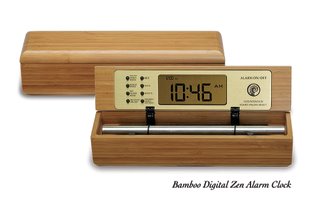 Choose the right alarm clocks for a refreshed mood in the morning - Visit Now & Zen, Inc - Boulder, CO Now & Zen – The Alternative Alarm Clock Shop
1638 Pearl Street
Boulder, CO 80302
(800) 779-6383
Posted in Bamboo Chime Clocks, Natural Awakening, Now & Zen Alarm Clocks, sleep, Sleep Habits, Zen Alarm Clock
 Lady purple - Gong Meditation Timer with Acoustic Sound You spill a cup of coffee all over your desk. How do you react? If you’re chatting on the phone with a new love interest, you shrug and chalk it up to giddy distraction. If it’s right before an important meeting, you feel annoyed, even angry with yourself. Why the difference? In one scenario, it’s just an accident. In the other, it goes to prove your day is doomed.
There’s a reason for this: We view the world through mood-colored glasses, interpreting events according to how we feel at the time. But while we may swear that the guy who cuts us off in traffic ruined our morning, it’s the way we respond that creates our experience. Life’s little annoyances themselves don’t sour a day; they serve as a reflection of the mood we’re already in. “When you focus on negative thoughts or memories, you begin to interpret events around you through that lens, which generates more negative thoughts,” says cognitive psychologist John Selby, coauthor of “Take Charge of Your Mind.” It’s a vicious cycle — and one that can cause even the best of moods to plummet.
When negative thoughts or difficult circumstances begin to upset you and make your blood pressure rise, stop and say to yourself: “I feel the air flowing in and out of my nose.” Let those words gently guide your attention to the actual experience of breathing.
 Meditation for a Better Mood Choose a stillness practice like meditating:
Meditation is generally an inwardly oriented, personal practice, which individuals do by themselves. Meditation may involve invoking or cultivating a feeling or internal state, such as compassion, or attending to a specific focal point. The term can refer to the state itself, as well as to practices or techniques employed to cultivate the state. There are dozens of specific styles of meditation practice; the word meditation may carry different meanings in different contexts. Meditation has been practiced since antiquity as a component of numerous religious traditions. A 2007 study by the U.S. government found that nearly 9.4% of U.S. adults (over 20 million) had practiced meditation within the past 12 months, up from 7.6% (more than 15 million people) in 2002.
Although meditation can be done in almost any context, practitioners usually employ a quiet, tranquil space, a meditation cushion or bench, and some kind of timing device to time the meditation session. Ideally, the more these accoutrements can be integrated the better. Thus, it is conducive to a satisfying meditation practice to have a timer or clock that is tranquil and beautiful. Using a kitchen timer or beeper watch is less than ideal. And it was with these considerations in mind that we designed our digital Zen Alarm Clock and practice timer. This unique “Zen Clock” features a long-resonating acoustic chime that brings the meditation session to a gradual close, preserving the environment of stillness while also acting as an effective time signal. The Digital Zen Clock can be programmed to chime at the end of the meditation session or periodically throughout the session as a kind of sonic yantra. The beauty and functionality of the Zen Clock/Timer makes it a meditation tool that can actually help you “make time” for meditation in your life.
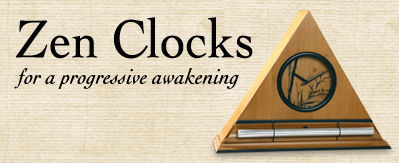 Meditation Timers and Gentle Chime Alarm Clocks by Now & Zen, Inc.
Now & Zen’s Chime Alarm Clock Store
1638 Pearl Street
Boulder, CO 80302
(800) 779-6383
Posted in Bamboo Chime Clocks, Meditation Timers, Meditation Tools, mindfulness practice
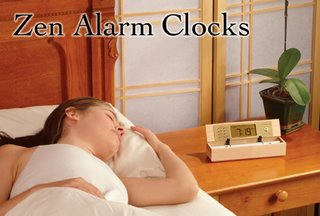 dreams There’s evidence that creative types may find it easier to dip into the well of their dreams. In one of the largest studies on dream recall and personality traits, conducted at the University of Iowa, subjects who were inclined toward imagination and fantasy in their waking lives were much more likely to remember their dreams and to report dreams with vivid imagery.
The power dreamers also scored higher in terms of “openness,” according to researcher David Watson, who measured their inclination toward novel experiences and different perspectives.
In her book “The Committee of Sleep: How Artists, Scientists, and Athletes Use their Dreams for Creative Problem Solving — and How You Can Too,” Harvard psychologist Deirdre Barrett recounts the stories of notable artists, athletes, and inventors to capture the sly beauty of dream-generated creativity. (My favorite example: In 1844, American inventor Elias Howe, puzzling over how to design sewing machine needles, reportedly woke from a dream in which he was being chased by cannibals carrying spears with holes in their pointed tips. He realized — eureka! — that machine needles would need holes at the front end.)
Barrett has found that 50 percent of people who tell themselves before sleep that they want to dream about a certain dilemma have dreams on their chosen subjects within one week, and that half of them find helpful new information. (The solutions aren’t necessarily as world-shaking as Howe’s. One student struggling to arrange furniture in a cramped apartment woke with a clear diagram of how to fit it all.)
 Ohara Koson (Shoson). 1877-1945 two carp and white lotus 1933 Recent studies at Harvard showed that people who’d spent hours playing a virtual-reality skiing game often dreamed later about aspects of the experience with a strong emotional prick — places along the course where they’d crashed, for instance — and generally performed better on the actual game after dreaming about it. It’s not exactly news to most of us that hot emotions and vexing problems tend to dominate dreams.
Believe me, I didn’t need a Ph.D. to decode the work worry in my stressful smoothie episode. But what is surprising, and to some extent vindicating to Freud, is just how emotionally beneficial our woolly night hallucinations seem to be. (Though he might be disappointed to learn how few of our dreams are overtly sexual: University of Montreal researchers, surveying 3,500 dream reports, found that just 8 percent of dreams for both men and women involved sexual activity.)
Whole Living, November 2010
Text by Louisa Kamps
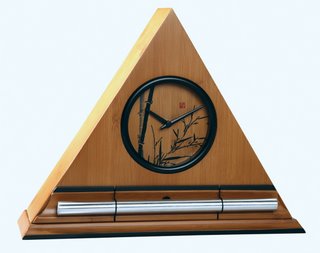 gentle chime alarm clocks help you remember your dreams
Now & Zen’s Alarm Clock Store
1638 Pearl Street
Boulder, CO 80302
(800) 779-6383
Posted in Chime Alarm Clocks, Dreams, sleep
 Unusual Gentle Clock Shop - Now & Zen, Inc. - Boulder, CO Just Say No to a Snooze Button
Most modern alarm clocks include a “snooze button” mechanism which allows the user to go back to sleep for a brief period after the initial alarm.
While this may make it easier for some people to “face the day,” here at Now & Zen we feel the whole concept of a snooze button is “all wrong.”
People want snooze buttons because they want to awaken gradually. And this is only natural because just as our bodies fall asleep gradually, our bodies also want to wake up gradually. However, with a regular, snooze button-equipped alarm clock the user is initially “startled awake” by the alarm, and then continually startled awake with each press of the snooze button. This is not the way to treat your body because it creates a kind of merry-go-round of multiple “rude awakenings.”
 Sleep Sounder - Choose the Most Unusual Clock with Acoustic Chimes
As an alternative we recommend using our Zen Alarm Clock, which wakes users gradually with a built-in 10 minute progression of gradually increasing acoustic chimes. It really is a better way to get up in the morning. Zen Alarm Clocks make waking up a beautiful experience. And once you experience the Zen Clock’s gradual 10 minute chime progression, you will never want to wake up any other way again.
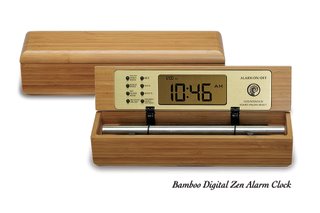 Gentle Clocks and Timers - Boulder, CO Now & Zen – The Home of the Most Unusual Gentle Clock
The Zen Alarm Clock Headquarter Store
1638 Pearl Street
Boulder, CO 80302
(800) 779-6383
orders@now-zen.com
Posted in Bamboo Chime Clocks, Natural Awakening, Now & Zen Alarm Clocks, sleep, Zen Alarm Clock
« Previous Page — « Previous Entries
Next Entries » — Next Page »
|
|
|
|